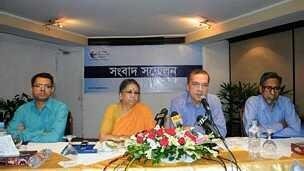The rate of corruption in Bangladesh has decreased, the increase in the number of bribe
Iftekharuzzaman at the TIB press conference in Dhaka
Transparency International Bangladesh, a corruption research institute, says that the rate of corruption in different sectors has decreased significantly.
However, TIB also says, there is a significant increase in the amount of money where corruption is there.
This information came in TIB's National Khana Survey 2012.
A survey of 7,000 people in 64 districts of Bangladesh showed that 63.7 percent of the people were victims of corruption.
But this number is less than 20 percent less than in 2010.
TIB chief executive Iftekharuzzaman told the BBC that corruption rates have decreased while taking services in government or private sectors, but bribery has increased.
"The level of corruption in the law enforcement agencies, judiciary, land administration, etc. is alarming"
Iftekharuzzaman
He thinks that a 'premium' is being added to the risk of corruption or for any other reason.
Iftekharuzzaman said that according to their estimates, the amount of bribe lending in 2012 was 2.4 percent of the total national income, almost double of 2010.
For some reason the absence of corruption has increased, the levels of corruption in various services sector are still at a critical level.
"The sectors which are important in daily life, such as law enforcement agencies, judicial system, land administration, etc., are in an alarming state," Iftekharuzzaman said.
He said that in the 2012 survey, labor and migration sector has emerged as the most corrupt sector.
According to the survey, most of the victims of labor and immigration sector have been deceived by their own relatives, friends or neighbors.
On the other hand, overall corruption has decreased, but corruption in public sector such as health, BRTA has increased, according to the survey. 